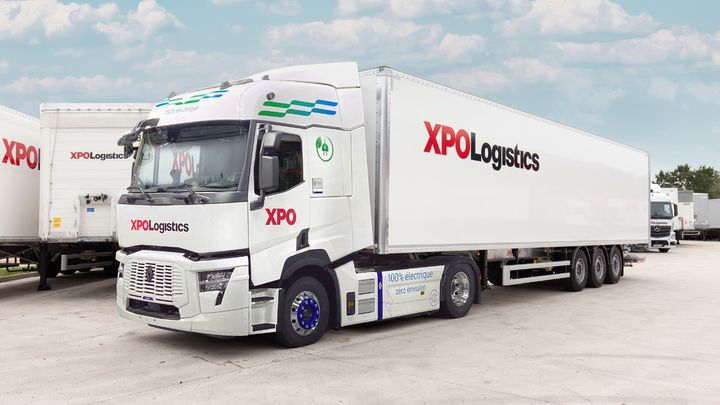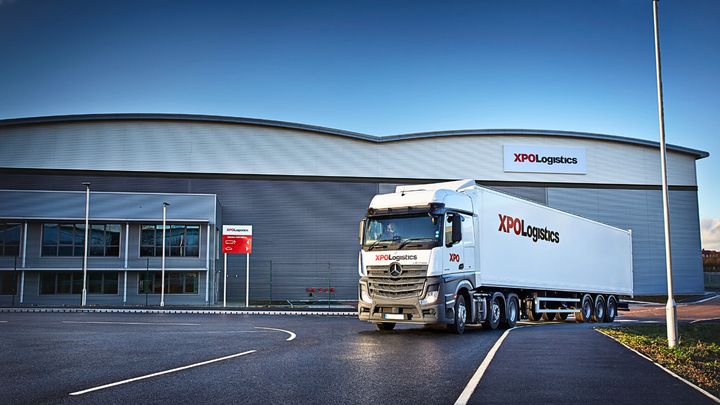Why Prioritise Supply Chain Sustainability Now and How to Decarbonise
Striving for zero emissions: the future is now
When it comes to sustainability, the logistics sector serves the economy and our entire society with a responsibility to reduce its environmental footprint for a greener future. And for innovative companies paving the way for this change, time is of the essence.
“For XPO, the future is now” – that’s what I recently stated at the IRU-POLIS webinar last month. I spoke about embracing new technologies designed to make supply chains more efficient while reducing environmental impact. I also touched on the importance of decarbonisation through strategic initiatives, noting how unification across the supply chain is imperative for the next step of its evolution.
Here, I want to explore in more detail how XPO is committed to driving a more sustainable logistics sector through decarbonisation and programmes that will help us reach - and even exceed - our goal of a 25% reduction in emissions by 2030.
Firstly, what is decarbonisation?
In simple terms, decarbonisation essentially refers to the reduction or elimination of carbon dioxide (CO2) emissions from various activities, processes, or industries. In the context of the logistics sector, decarbonisation involves minimising the carbon footprint associated with the transportation, warehousing, and distribution of goods.
5 reasons why sustainable supply chain management matters
There are several reasons why decarbonisation will be such an important factor for the future of logistics.
1. Environmental impact
Of course, this almost goes without saying—the transportation sector is a significant contributor to greenhouse gas emissions and Nox primarily through the burning of fossil fuels in trucks, ships, planes, and other modes of transport. According to the International Energy Agency, that transport was responsible for almost 37% of global carbon emissions in 2020 and heavy trucks alone accounted for 25% of these C02 emissions. XPO alone manages a European fleet of more than 20,000 vehicles, so when you take the wider industry into account that starts to look like a sizable collective footprint.
2. Regulatory compliance
Beyond the initial 2015 Paris Agreement (which set out an ambition for an industrial movement towards net-zero emissions), governments and regulatory bodies are increasingly implementing stricter regulations and targets to reduce carbon emissions and combat climate change. To avoid being penalised, the marketplace needs to continue operating with compliance at the forefront of business evolution.
3. Corporate social responsibility (CSR)
Transport and Logistics are part of the citizens daily life and eco-system. For that reason, it needs to be involved and contribute back towards the community where it belongs. At XPO, for example, we have adopted a variety of CSR initiatives aimed at reducing environmental impact and showcasing a long-term commitment to sustainable logistics. In fact, together with Digitisation of the Supply Chain and Excellence of teams, decarbonisation forms the three-pillar XPO value proposition.
4. Financial impact
Transitioning to cleaner and more efficient transportation modes and technologies can lead to cost savings. For example, electric vehicles and renewable energy sources can reduce fuel and energy costs over time, while also potentially benefiting from government incentives and subsidies.
That being said, the adoption and installation of new technology also obviously comes at a price of its own—and it’s not cheap. Therefore, decarbonisation should arguably be more generally viewed through the lens of an investment, as opposed to a cost-saving initiative as such.
5. Market demand
Businesses, but also the end consumers – in actual facts we, as citizens - are increasingly demanding for sustainable and environmentally friendly supply chain practices. Being an early adopter, XPO is firmly committed to the industry’s shared responsibility to make positive changes always aligned with ever-evolving compliance, from the historical long-haul transportation fleet to our fast -developing Last Mile delivery Network.
Our commitment to decarbonisation at XPO
So, what does a decarbonisation strategy look like in action? With our commitment to carbon neutrality by 2050, XPO is now pioneering a variety of initiatives for a sustainable supply chain, pushing for decarbonisation, and implementing alternative transportation and energy solutions. This core commitment is exemplified by an ambitious goal for a 25% reduction in emissions by 2030.
“One-size-fits-all” vs tailor-made solutions
At XPO, we believe there’s no “one-size-fits- all” approach and that initially, our duty is to offer a range of operational solutions to decarbonize that can be combined, such as:
- Optimizing freight loading and delivery routes through the use of technology
- Maximising the volume usage of the vehicle with double decks or double-stacking devices
- Increasing total loaded length of the vehicles (with Jumbo trucks throughout Europe as well as megatrucks and duotrailers in Spain, Czech and Nordics, or longer semi-trailers in the UK)
- Promoting, training our team and monitoring eco-driving.
Proactive investments
In fact, the XPO LESS® (Low Emissions Sustainable Solutions) programme has also been developed to drive the increased use of alternative fuels and vehicles as a whole—including HVO and gas as well as electric.
The deployment of the strategy behind achieving the ambitious goal of a 25% reduction in emissions by 2030 has already included a proactive investment into zero-emission vehicles, such as the recent acquisition of 165 electric trucks, in parallel of an incoming electric last-mile delivery fleet.
Last but not least, the programme also promotes the use of multimodal transport solutions that combine road, rail, short sea shipping and river transport. For example, this has notably included the use of barges to transport goods to Paris via the Seine River from as far back as 2012 and we recently invested in P400 units, the most widely used huckepack semi-trailers for the combined distribution of goods by road, rail and sea, because it fits the four-metre maximum height at which a semi-trailer can be transported by rail.
What awaits down the road?
You guessed it—the future is now. So, it’s critical that new advancements in technology are embraced and adopted as soon as they’re made available. However, this also needs to be met by the necessary infrastructure (notably EV charging points, HVO capacity fuelling and hydrogen availability).
With our recent investment in EV trucks, XPO intends to capitalise on the opportunity to go fully 100% electric on urban deliveries in the Republic of Ireland, so cross-market innovation and installation need to be prompt for decarbonisation dreams to be realised.
It’s also worth mentioning that any evolution of the regulation would therefore need to be pragmatic. Environmental taxes need to support investments in decarbonated technology. The actual availability of financing is also something to be considered. For example, accessibility to finance at preferred interest rates for decarbonisation initiatives could be an intriguing incentive for the industry as a whole.
Beyond this, it’s also important that European transport companies remain competitive—with costs shared along the supply chain.
Together, we can make a lasting positive impact
In light of potential challenges, XPO remains definitely positive about decarbonisation—having already achieved in 2022 an 11.2% reduction in emissions since 2019. And for 2023, we are more than halfway to our 2030 target, in advance to our roadmap!
The Why is clear. Testing, implementing, validating and approving will be the key components of the How the sector moves towards a greener future with an emphasis on onboarding new technology at the earliest opportunity.
With all this in mind, sustainable supply chain management can become all the more reachable as we drive towards a greener future for logistics.


